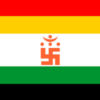Jains see every Jiva as being in a relationship to every other, including the angels and hell beings. Much of the imagery of the Buddha being confronted by demons comes from that belief. But unlike more common beliefs, the angels and demons are equal to humans. So reviling demons gives you negative karma, and attachment to angels gives you positive karma, and neither allows liberation.
They believe in the realties of these things, but form no pantheon and if a Deva seems to be a god, or a hell being seems to be an incarnation of evil, they have no privileged place and are just on the great wheel like any other Jiva or soul. They do believe in souls, where the Buddhist focus leans to non self, or no immortal soul. Jains see that your soul is immortal, and those who achieve moksha no longer spin on the wheel. They do relate to other Jivas still, but are in no way disturbed. The concept of nirvana exists in Jainism.
They stop incarnating at a certain stage, when they reach nirvana? Yes, they seek to end incarnation and achieve pure existence.
A core concept of Jainism is equanimity and has been seen as a relativistic doctrine. This is part of how they integrated so well with Hinduism and Buddhism. Another is a doctrine of no one view being the one truth. The path has no one end in Jainism.
Other ends besides nirvana? The Jains have a concept of a type of person, called a Kevalin. A Kevalin can see all of the truth and reacts differently. They are rare, and aren’t Saints. But due to the nature of self, even in finding moksha or liberation you don’t loose self nature. Thus you see clearly, but not all. See rightly, but are not omniscient. This is part of why they don’t worship the Saints.
A Kevalin is in body or out. They don’t fall into what the Jains call the fourfold order which is; saint, monk, nun, and layperson. A Kevalin could live as a hell being, but would not see it as the others do. Or as a Deva, but still see heaven for what it is, or as a human. All the same. So sees clearly and impassionately, though can still incur karma and tends to. It is open to all views.
In some ways is this similar to how we see our souls reach oneness at the end of its journey? Actually no, the only oneness in Jainism is oneness with self. It is more like the Egyptian concept of entering into fellowship with the gods then the agape of union with Brahma say, which is a Bahkti concept. They seek emotive transcendence in that path. It is very passionate. In Jainism you maintain your individuality, but do enter into fellowship with the Saints. Those who have likewise achieved moksha. Basically a pass into the club, but no exclusivity. None that we as the uneasy humans souls don’t create.
We create the separation through our karma in Jainism, good or bad. Jainism teaches doing good not for the purpose of joy, but because it creates space for peace thus easing the way to liberation. There is no moralism in Jain teachings. Their goals can be seen as very pragmatic, they see selfishness as self sabotage.
Do they see the work being very long over multiple lives, or possible in a single life? Both, though the nudists sect believe women can’t achieve it in that life, because they can’t embrace abstinence from clothing.
Your thoughts are welcome. Be well friends.
Travis Saunders
Dragon Intuitive
~science,mysticism,spirituality~



Leave a Reply